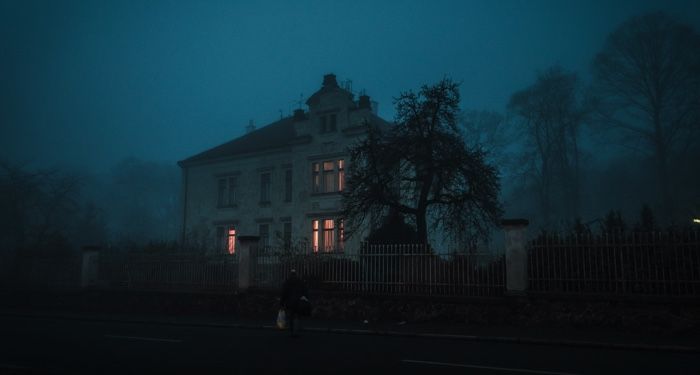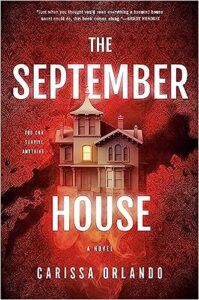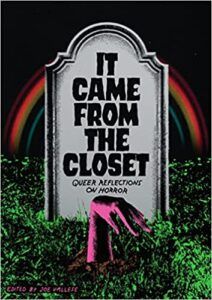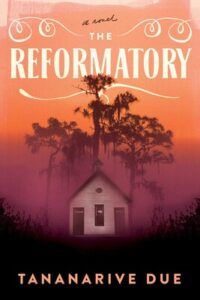Content warnings: domestic violence, intimate partner violence, gaslighting, race-based violence, xenophobia, sexual abuse
I love a horror novel with a sense of humor, and the beginning of Carissa Orlando’s The September House feels like a typical haunted house story, with just a dash of silly thrown in. A couple moves into a house. Supernatural shenanigans ensue. The marriage is shaken to its core as each partner deals with the hauntings in their own way. And so on.
When the reader is first introduced to Margaret, our protagonist, she has been living in the titular house for several years. Just a few months before, her husband left her, unable to live in the haunted house for a single moment more. We soon learn that the hauntings are at their most severe every September…and September is almost here.
“Everyone can make minuscule adjustments,” insists our narrator, speaking of her reluctance to leave the first house she’s been able to call her own. “Then there’s another change, a bigger one, but you can still adjust so easily.”
It’s not until later that we learn that this statement — and all of life in the haunted house — is an extended metaphor.
Horror As Metaphor
It’s no secret that much of horror — for better or for worse — operates as a stand-in for our real-life, societal fears. During the time when nuclear weapons were first being developed, there was an increase in psychological horror. During the ’70s and ’80s, as “family values” were being threatened, suburbia-based slasher films and gory pulp paperbacks became popular. Alien invasion stories have stood in for humanity’s fear of those who are different from us. And themes of plagues and the apocalypse (I read so many of these at the height of COVID!) nod toward our fear of infectious diseases.
More recently, films like Get Out and The Blackening have been direct responses to increasingly visible race-based violence, and They/Them was a queer psychological thriller/slasher flick that showed that nothing is more terrifying than the real-life LGBTQ+ experience. We’ve even gotten anthologies like Other Terrors and It Came from the Closet to highlight these themes.
Hell, our personal fears get plenty of air time, too. I can track my taste in horror by the stages of my life. There was that year I struggled with some especially unhealthy friendships (betrayal horror!). For decades, I worried about being stuck as the result of a wrong decision (claustrophobic horror!). The moment I became a mother and was suddenly afraid of…everything (ALL THE HORROR).
Haunted Houses and the Way They Shatter Our Sense of Safety
Haunted house stories are their own special brand of horror. The place in which we live is supposed to be where we create a home. Where we surround ourselves with people we love and with things that represent who we are — places of safety and shelter and love.
Haunted house stories — particularly haunted house stories where the hauntings occur in the place where we live on the regular — shatter that sense of safety.
(Though I’m not above being terrified by a haunted Airbnb. I recently watched Barbarian while my family was out of town, and I ended up sleeping with meat claws next to my bed for the rest of the week.)
But while all haunted house stories are, at their core, about being unsafe in the one place where you’re supposed to be able to relax, for the love of all that is holy, they can also act as metaphors for other real-life horrors.
All the Metaphor-Laden Haunted Houses
On an intellectual level, I’ve always been aware that horror = metaphor. But I loved the way it was handled in Orlando’s book so damn much; it led me to reflect on all the haunted house fiction I’d enjoyed recently. And I found more than I expected, as haunted houses aren’t necessarily my favorite horror trope.
When I read Jac Jemc’s The Grip of It, for example, I was thrilled at the themes of mental health and gaslighting. (I do so love a story where you can’t be sure what’s real and what’s not, as they play with our ability to trust ourselves.) When I read Francesca Momplaisir’s My Mother’s House, I was truly horrified to find that the seemingly sentient house had long harbored a horrible secret, one built upon (SPOILER ALERT / TRIGGER WARNING) imprisonment and sexual abuse.
In Pornsak Pichetshote’s Infidel, an apartment complex is haunted by evil entities that feed on residents’ xenophobia. The Reformatory by Tananarive Due and When the Reckoning Comes by LaTanya McQueen each tackle historical racism in their own way, with the “haunted house” of the former book taking the form of a reform school and the “haunted house” of the latter book taking place on a whole-ass former plantation-turned-wedding-venue.
When I read How to Sell a Haunted House by Grady Hendrix — in which siblings are forced to work together to sell their childhood home after the death of their parents, only to be bedeviled by a haunted puppet collection (you heard me) — I didn’t expect to be punched in the gut by a larger, deeper story about sibling estrangement.
And then there’s The September House.
MAJOR SPOILERS AHEAD!
The Metaphor at the Heart of The September House
Margaret speaks about the process of adjusting to life in a haunted house in a way that reminds me of that boiling frog fable, the one where it’s posited that if a frog is put into tepid water, which is then slowly brought to a boil, it won’t perceive that it’s in danger and will allow itself to be cooked to death. It’s only later we realize that every statement she makes about life in her haunted house can also be applied to the abusive marriage we don’t initially realize she’s in.
Because much like the process of discovering that one lives in a haunted house and then adjusting to life in that house, domestic abuse also often starts out small and then builds. (“That was the first time and I barely thought anything of it. … He apologized the next day, but I barely remembered what for.”)
Much like living in a haunted house can be isolating (Margaret feels deeply uncomfortable the few times she leaves the house), abusers also often isolate their partners in order to facilitate their continued abuse.
Much like what it takes to survive life in a haunted house (Margaret speaks of the rules she sets to make the hauntings more bearable and the ways in which her ability to bend is her strongest asset), those living with intimate partner violence also find ways to manage their abusive partner, making life marginally more bearable.
There is one passage that encapsulates all of this perfectly, and which hit me hard with the sense of personal recognition it brought about.
“This house was everything I’d ever wanted,” writes Orlando-as-Margaret. “Sure, it wasn’t perfect, but sometimes it actually WAS. … It wasn’t horrible every single day — so few things ever are—and when it wasn’t horrible, it was almost lovely. I knew how to survive here, and I always had the sense that if I just survived long enough, if I just played by the rules well enough, I could make it into a perfect home once and for all. I just needed to work a little harder.
“I loved this house,” the scene continues. “And you didn’t give up on the things you loved.”
Oof. Suddenly, I was the proverbial frog, brought to a boil by a metaphor that had slowly built upon itself over the course of its 300+ pages.
And that’s when I realized that, hell, maybe haunted house stories are the most terrifying horror stories of all.
Metaphors within metaphors.
Narratives that slowly break you apart, only to reveal your deepest fears.
For more haunted house reads, check out this list of haunted house novels by women, or take this quiz and get a haunted house book recommendation. And if you’d like to dig even deeper into your IRL fears, check out my list of dystopian tales that are too damn real.



